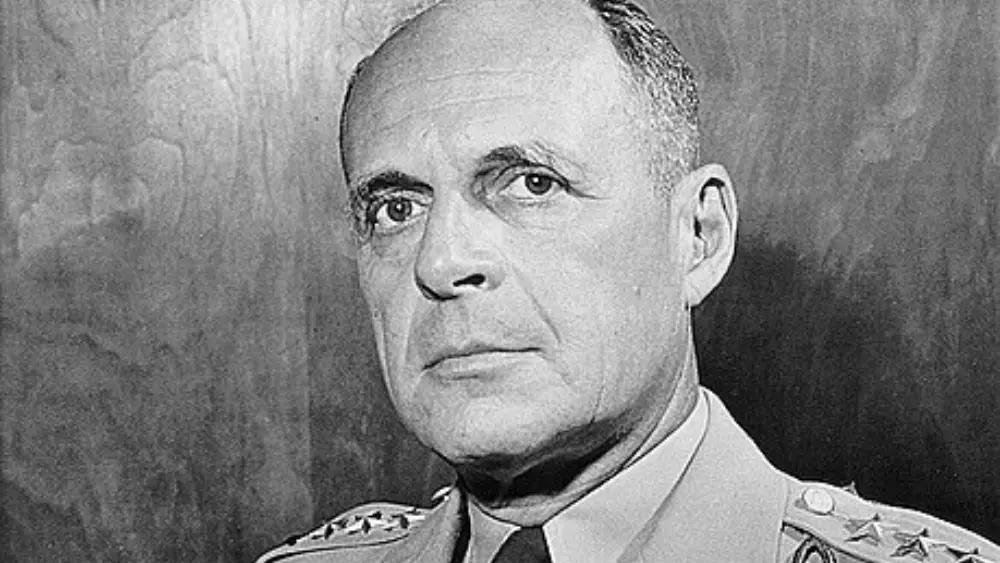General Matthew Bunker Ridgway, born on March 3, 1895, in Fort Monroe, Virginia, was one of the most distinguished and respected military leaders in American history. He is known for his exemplary service during World War II and the Korean War.
Early Life and Military Education
Early in his life, Matthew Ridgway exhibited a profound commitment to his country, laying the foundation for his illustrious military career. Born in 1895, Ridgway’s path toward the military was deeply influenced by a sense of duty and patriotism. This unwavering devotion led him to embark on a remarkable journey that would ultimately shape the course of his life. It was at the prestigious United States Military Academy at West Point where Ridgway’s remarkable qualities became evident. Throughout his years at West Point, he not only displayed exceptional intellectual prowess but also exhibited a natural aptitude for leadership. After graduating from the academy in 1917, his timing aligned with the onset of World War I, propelling him into the epicenter of global conflict and igniting his military service.
Matthew Ridgway’s graduation from West Point marked the beginning of an extraordinary career that spanned decades and witnessed pivotal moments in world history. His tenure at West Point had provided him with a solid foundation in military theory and leadership, preparing him to face the challenges of wartime leadership. As he embarked on his World War I journey, he displayed unwavering dedication to the principles instilled in him at West Point. This early experience would set the stage for Ridgway’s future accomplishments, as he would go on to become one of the most respected and accomplished military leaders in American history. Ridgway’s story is a testament to the power of education, leadership, and unwavering patriotism in shaping the destinies of individuals and the course of history.
Matthew Ridgway: World War I and Interwar Years
Matthew Ridgway’s early military journey during World War I was marked by his service as a second lieutenant in the artillery, a role that would prove pivotal in shaping his future as a military leader. Stationed in the midst of one of the most crucial periods in world history, Ridgway gained invaluable combat experience. His time in the artillery not only exposed him to the harsh realities of warfare but also highlighted his burgeoning leadership potential. As he rose to the challenges of the battlefield, it became evident that Ridgway possessed the qualities necessary for effective military leadership, setting the stage for his remarkable career in the years to come.
In the interwar years that followed World War I, Ridgway’s commitment to military excellence remained unwavering. Recognizing the importance of continual self-improvement and education, he dedicated himself to further honing his military skills and expanding his knowledge. These years of rigorous preparation and study were instrumental in shaping Ridgway into the exceptional military strategist and leader he would become. His journey through World War I and the interwar years laid the groundwork for an illustrious career that would see him rise to the highest ranks of the U.S. military and leave an enduring legacy in the annals of military history.
World War II: A Rising Star
World War II marked a pivotal chapter in General Ridgway’s illustrious career, propelling him to the forefront of American military leadership. Throughout the war, Ridgway consistently demonstrated his exceptional abilities as a commander in two critical theaters of operation, the European and Mediterranean theaters. His leadership was most prominently showcased during two momentous campaigns – the Allied invasion of Sicily and the Battle of Normandy. In these key military operations, General Ridgway’s strategic acumen, tactical brilliance, and unwavering resolve not only contributed to the success of Allied forces but also earned him a reputation as a rising star within the U.S. Army.
As the Allied forces stormed the beaches of Sicily and later embarked on the historic D-Day landings in Normandy, General Ridgway’s leadership played a crucial role in orchestrating these complex and high-stakes military endeavors. His ability to navigate the challenges of large-scale amphibious invasions and coordinate multinational forces showcased his exceptional command skills. These pivotal moments in his career firmly established General Ridgway as a distinguished and respected military leader, setting the stage for his future contributions to the U.S. Army and solidifying his legacy in the annals of military history.
Matthew Ridgway: Commander of the 82nd Airborne Division
A zenith in General Ridgway’s storied career was his command of the 82nd Airborne Division, a role that showcased his remarkable leadership qualities and unwavering courage. This pivotal assignment reached its zenith during the momentous D-Day invasion, where Ridgway’s exceptional skill and audacious leadership came to the forefront. As he led his troops into the crucible of battle, he displayed a rare blend of tactical prowess and personal bravery that not only earned him the admiration of his soldiers but also solidified his reputation as an indomitable military leader.
General Ridgway’s command of the 82nd Airborne Division during the harrowing D-Day operation stands as a testament to his unwavering dedication to duty and the welfare of his troops. His ability to coordinate and inspire his soldiers in the face of daunting odds showcased his exceptional command and organizational skills. This chapter in his career, marked by courage under fire and exceptional leadership, further enriched his legacy as a distinguished military figure and underscored the profound impact he had on the success of Allied forces during World War II.
The Korean War: Turning the Tide
General Ridgway’s pivotal role in the Korean War stands as one of the most enduring and transformative aspects of his military career. Taking command of the United Nations forces during a precarious juncture in the war, he faced a situation where the conflict appeared to be grinding to a standstill. In response, General Ridgway demonstrated exceptional leadership marked by innovative tactics and an indomitable spirit. His strategic brilliance and unwavering determination breathed new life into the United Nations’ efforts, ultimately shifting the tide of the conflict in their favor. Under his guidance, the front lines stabilized, and the prospects for a peaceful resolution grew stronger as he deftly navigated the complexities of warfare on the Korean Peninsula.
General Ridgway’s legacy in the Korean War extends far beyond military victories; it encompasses his ability to lead with vision and adaptability. His astute command and diplomatic finesse eventually led to negotiations that resulted in a ceasefire agreement, effectively ending the hostilities. His remarkable achievements during this unruly period underscore the profound impact a resolute and visionary leader can have in times of crisis, solidifying his place in history as a commander who played a pivotal role in shaping the outcome of a pivotal conflict.
Matthew Ridgway: Supreme Allied Commander, Europe
Matthew Ridgway’s remarkable military brilliance and unparalleled leadership abilities led to his appointment as the Supreme Allied Commander, Europe (SACEUR), a position of immense responsibility during the critical early years of the Cold War. As SACEUR, Ridgway assumed a central role in defending Western Europe, where the specter of global conflict loomed large. His appointment to this prestigious post was a testament to his sterling reputation as a commander and strategist and his unwavering commitment to safeguarding the interests of the Western world.
In the unruly backdrop of the Cold War, Ridgway’s leadership at the helm of NATO forces in Europe was marked by a keen understanding of the geopolitical complexities of the era. He skillfully navigated the delicate balance of military readiness and diplomacy, playing a pivotal role in ensuring the security and stability of Western Europe during a time of great uncertainty. His tenure as SACEUR solidified his place as a respected and influential figure on the global stage, further cementing his legacy as one of the most accomplished military leaders in American history.

Legacy and Contributions
General Matthew Ridgway’s enduring legacy is a testament to his unwavering commitment to the core principles of leadership, discipline, and valor. Throughout his storied career, he exemplified these virtues on the battlefield and in high-stakes command positions. His strategic brilliance and personal courage played pivotal roles in securing victory for the United States and its allies in two major conflicts: World War II and the Korean War. These achievements not only underscore his exceptional military acumen but also highlight his ability to adapt and thrive in the most challenging of circumstances.
Ridgway’s leadership style, marked by a willingness to lead from the front and a unique ability to inspire his troops, continues to serve as a model for military leaders to this day. His unwavering dedication to the well-being of his soldiers, his ability to innovate in the face of adversity, and his steadfast commitment to the principles of democracy and freedom have made a lasting impact on the history of the American military. General Ridgway’s contributions and legacy extend far beyond the battles he fought; they encapsulate the enduring values and principles that continue to guide the armed forces and inspire leaders across generations.











